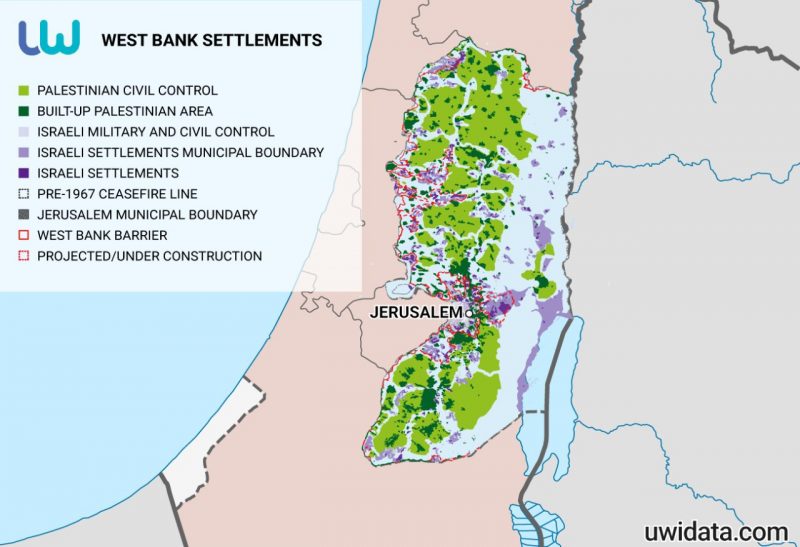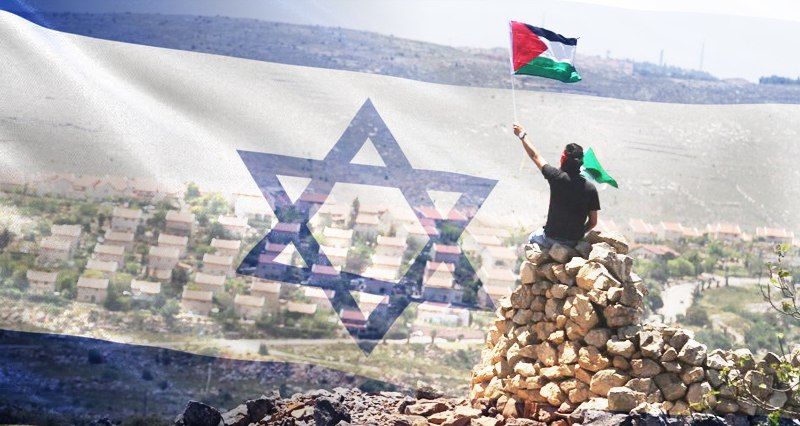As the American edition of Axios reports this week, the head of the State Department Michael Pompeo, adviser to the president on national security Robert O’Brien, the senior adviser and the son-in-law of the head of the American state Jared Kushner and Ambassador of the USA in Israel David Friedman are supposed to meet with Donald Trump to discuss Israel’s plans for the annexation of the West Bank of the Jordan River.
President Trump’s administration has turned out to be the most pro-Israeli administration the United States has ever seen. The recognition of Jerusalem as the capital of Israel and the transfer of the American embassy there, the recognition of Israeli sovereignty over the Golan Heights, and a peace plan that involves the full surrender of all positions by the Palestinians and the transformation of the Palestinian state into an Israeli colony have all taken place under Trump’s watch. However, he now needs to agree to actions that could forever erase the very idea of a two-state solution for Israel and Palestine.
https://unitedworldint.com/7490-trumps-deal-of-the-century-a-stillborn-plan-for-legalized-apartheid/
Netanyahu’s plan
The idea of annexation of Jewish settlements in the West Bank was launched by Israeli Prime Minister Benjamin Netanyahu in May. At the end of May, Netanyahu stated that July 1 remains the main date for the beginning of the extension of Israeli sovereignty in “Judea and Samaria”. Under international law, the West Bank, occupied by Israel in 1967, is not a territory of the Zionist State, and its annexation is considered illegal internationally.
In May, Netanyahu announced that he will soon begin the realization of the “Deal of the Century” – a joint plan with the US, which involves the annexation of “Israeli ancestral lands”, the expulsion of Palestinians from there and the end of the Palestinian-Israeli conflict. It is indicative that the Trump plan allowed Israel to “incorporate” settlements, which can be considered a kind of permit for full annexation.
https://unitedworldint.com/4948-trumps-deal-of-the-century-a-plan-for-peace-or-destruction/
Following that, Palestinian President Mahmoud Abbas announced the termination of all agreements with Israel and the United States.
The Netanyahu plan involves extending Israeli sovereignty to all areas where Jewish settlements are located in the West Bank – where Israeli citizens live – but the status of the settlements themselves has not yet been resolved. There are now 430,000 Jews living there. However, in this case, the territories of 2.1 million and 3 million Palestinian Arabs will be fragmented and will not be able to be formed into any normal state. The Government of Israel has come very close to the annexation of about 30% of the West Bank.
It is noteworthy that Netanyahu is not going to give any civil rights to Palestinians in the West Bank. According to him, they “remain Palestinian subjectsin enclaves.”
Once the settlements are considered an integral part of Israel under Israeli law, there is no chance that Tel Aviv will ever leave this land to the Palestinians. Earlier, Israel withdrew its settlements from Sinai, which ceded to Egypt and the Gaza Strip, but the premise for the withdrawal, that Israel did not consider these territories to be under its sovereignty.

Electoral factors
For Netanyahu, Israeli sovereignty over much of the West Bank will mean consolidating support for a right-wing, nationalist electorate. That support is important in the context of an ongoing criminal trial against him on corruption charges. It can also be expected that Netanyahu’s shaky Likud party coalition with the opposition Kahol Lavan bloc will not last long.
In this case, the country may expect new elections to the Knesset, in which Netanyahu, who has become a national hero, will undoubtedly win. Also, it should not be discounted that the accession of settlements is a dream of any Israeli nationalist like Netanyahu. Since the chances of Donald Trump’s reelection do not seem very high at present, Netanyahu may try to reunite the West Bank before a presidential election. If Joe Biden wins, the US will nonetheless be faced with a situation which is already a done deal.
In the midst of the US election campaign, all foreign policy actions are now critically important, as they can bring him votes and support from powerful groups. The influential American Jewish lobbying organization AIPAC supports the annexation of the West Bank. The “biblical rights” of Israel are actively defended by Evangelicals. Protestant fundamentalists are an important electoral resource of the Republican Party. On May 23, John Hagee, chairman of Christians United for Israel, in a column for the Israeli newspaper Haaretz, expressed the views of these groups, calling on Don’t Delay Trump’s Peace Plan, and Israel’s Biblical Sovereignty.
With Trump’s pre-election rating falling, it is important for him to mobilize all supporters of the Republicans. A new step in support of Israel may become such a step. In addition, the US may press Israel to relax its concerns with China in exchange for support for annexation.
Are Arabs ready to fight?
UN Secretary General Antonio Guterreshas spoken out against Israel’s plans to annex the West Bank, while the United Nations Human Rights Council condemned the idea.
Turkish President Recep Tayyip Erdogan declared that “We won’t allow the transfer of Palestinian land to anyone.”
The United Kingdom, France and Germany spoke out against the plans as well. However, the negative reaction of the EU countries does not mean that the Europeans will take any real measures, for example, imposing sanctions against Israel if it goes for annexation. So far, the EU has been demonstrating toothless policy in the Middle East, which shows the situation with the long-suffering mechanism of circumvention of the American sanctions against Iran.
Condemning in words the policy of the US in the Middle East, the EU cannot really oppose it.
Arab countries, including Jordan, Saudi Arabia and the United Arab Emirates, have also denounced the plans.
However, it is difficult to expect that Arab countries will be able to do something to make Israel retreat from its plans. Senior Arab diplomats, along with senior defense and intelligence officials in Egypt and Jordan, confirmed to Israel Hayom newspaper, that Egypt and Jordan will only symbolically oppose the annexation of the West Bank.
Anwar Gargash, the United Arab Emirates’ minister of state for foreign affairs, recently performed at the Washington-based Middle East Institute. He noted that his country opposed the extension of Israeli sovereignty to the West Bank.
At the same time, the diplomat stressed that in case of annexation, his country could move from supporting the principle of two states to the idea of one state:
“Ultimately, I personally believe that if we are going where we are going today, and we lose the possibility of really implementing a two-state solution, we will really be talking about equal rights and one state”.
The same Anwar Gargash, told the American Jewish Committee that despite the lack of diplomatic relations with Israel, the UAE maintains lines of communication with the Zionists and stated the need to develop ties with Israel.
Under these circumstances, Israeli gestures in favour of Turkey in the Eastern Mediterranean can also be seen as attempts to tie Ankara together before declaring Israeli sovereignty over the West Bank. Turkey is the only influential Islamic country in the region, with the exception of Iran, which could create problems for Israel after the annexation.
On the other hand, Turkey could become the only Islamic power that could be affected directly by Israel’s actions to eliminate Palestinian statehood. The other day, Palestinian Ambassador to Turkey Faed Mustafa said that the Palestinians could conclude a maritime delimitation agreement with Turkey.
“We are open for every idea to deepen our relations with Turkey, and this includes a deal on exclusive economic zones,” Mustafa told the Aydinlik newspaper.
“Palestine has oil and gas located in the eastern Mediterranean. We are ready to cooperate in these areas and sign a deal,” the Palestinian ambassador said. Support for Palestine may strengthen Turkey’s demands for a fair redistribution of resources in the Eastern Mediterranean.
A “War Scenario”
The implementation of the “deal of the century” will make Palestine an almost geographically unviable state. It is likely to lead to an armed struggle of Palestinian Arabs against Israel’s seizure of the West Bank, Gaza Strip and Jerusalem.
Although, according to the Israeli Ministry of Intelligence Services, no mass violence by Palestinians is expected in response to the annexation, the Israeli Ministry of Defense has decided to stage “war scenario” drills.
The main consequence of the annexation of the West Bank will be a blow to the image of Arab countries as defenders of national interests of Arabs and Islam.
The principle of establishing two states can be considered buried. The previous forms of interaction between Palestinians and Israelis could also be considered dead.
The annexed parts of the West Bank would be as much part of the territory of Israel as any other part. It would make no difference to the Palestinians to demand the return of the West Bank or any other part of their historic lands occupied by Zionists. Both will only be possible by military defeat of Israel. It won’t make any difference whether to demand the creation of an Arab state on a small part of the territory of Palestine or all of it. From here we can conclude that the Palestinian movement will radicalize.
The Fatah movement, as it turned out to be powerless in such a situation, is waiting for a crisis. It is Fatah-run territories in the West Bank that will be most affected by Israeli actions. Hamas that governs the Gaza strip will be forced to radicalize itself. However, the terrorist structures of all kinds, a critic of both Hamas and Fatah, will get new opportunities to recruit new fighters.
In such a situation, the Palestinian resistance movement will have three ways to develop:
1.) Either to demand the establishment of a full-fledged state of Israelis and Palestinians with equal right to Arabs – to follow the path of the South African anti-apartheid movement.
2.) Or radicalization – an uncompromising option to create only an Arab state on the territory of all former British mandate of Palestine without any concessions to the Israelis.
3.) Finally, the loss of success of the idea of Palestinian statehood might push many towards the ideology of militant Islamism, jihad and the Caliphate.

















Leave a Reply